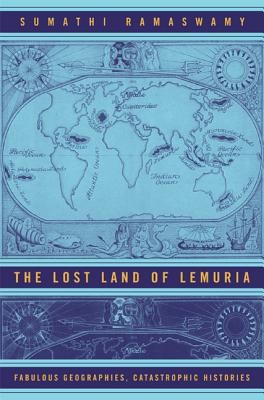
- We will send in 10–14 business days.
- Author: Sumathi Ramaswamy
- Publisher: University of California Press
- Pages: 334
- ISBN-10: 0520244400
- ISBN-13: 9780520244405
- Format: 15.8 x 22.5 x 2.2 cm, minkšti viršeliai
- Language: English
- SAVE -10% with code: EXTRA
Reviews
Description
During the nineteenth century, Lemuria was imagined as a land that once bridged India and Africa but disappeared into the ocean millennia ago, much like Atlantis. A sustained meditation on a lost place from a lost time, this elegantly written book is the first to explore Lemuria's incarnations across cultures, from Victorian-era science to Euro-American occultism to colonial and postcolonial India. The Lost Land of Lemuria widens into a provocative exploration of the poetics and politics of loss to consider how this sentiment manifests itself in a fascination with vanished homelands, hidden civilizations, and forgotten peoples. More than a consideration of nostalgia, it shows how ideas once entertained but later discarded in the metropole can travel to the periphery--and can be appropriated by those seeking to construct a meaningful world within the disenchantment of modernity. Sumathi Ramaswamy ultimately reveals how loss itself has become a condition of modernity, compelling us to rethink the politics of imagination and creativity in our day.
EXTRA 10 % discount with code: EXTRA
The promotion ends in 23d.15:54:39
The discount code is valid when purchasing from 10 €. Discounts do not stack.
- Author: Sumathi Ramaswamy
- Publisher: University of California Press
- Pages: 334
- ISBN-10: 0520244400
- ISBN-13: 9780520244405
- Format: 15.8 x 22.5 x 2.2 cm, minkšti viršeliai
- Language: English English
During the nineteenth century, Lemuria was imagined as a land that once bridged India and Africa but disappeared into the ocean millennia ago, much like Atlantis. A sustained meditation on a lost place from a lost time, this elegantly written book is the first to explore Lemuria's incarnations across cultures, from Victorian-era science to Euro-American occultism to colonial and postcolonial India. The Lost Land of Lemuria widens into a provocative exploration of the poetics and politics of loss to consider how this sentiment manifests itself in a fascination with vanished homelands, hidden civilizations, and forgotten peoples. More than a consideration of nostalgia, it shows how ideas once entertained but later discarded in the metropole can travel to the periphery--and can be appropriated by those seeking to construct a meaningful world within the disenchantment of modernity. Sumathi Ramaswamy ultimately reveals how loss itself has become a condition of modernity, compelling us to rethink the politics of imagination and creativity in our day.


Reviews